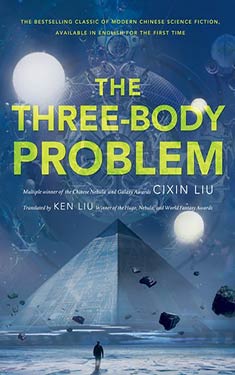Cixin Liu
Completed 1/31/2016, Reviewed 2/1/2016
4 stars
This is the Hugo Winner for 2015. It’s by the most beloved SF writer in China,
translated by Ken Liu, an award winning author himself. It’s the first of a trilogy that is somewhat
reminiscent of “Ender’s Game” and “Contact”.
The novel is fairly complex, with a lot of setup to explain where some
of the characters come from and the context of the society in which the search
for extraterrestrial life begins in China.
The main plot follows Wang Miao as he tries to infiltrate a scientific
organization, the ETO, for the government, and to explain why he is seeing a
countdown first on photos he’s taking, then later in his field of vision. In doing so, he comes across a game called
Three Body. Its primary goal is to
figure out how a civilization can survive on a planet that revolves around
three suns, a classic physics problem. Through the game and his contacts within it,
he discovers that the world is on a path of destruction abetted by the
scientists playing the game.
 Overall, the book is quite good, but the science fiction is
very hard. Even though I failed physics
in college, I understood the concepts enough that I was able to follow the
science heavy plot. I think having it
encapsulated in a game context kept me engrossed in the expositions that would
probably be quite terse for many readers.
Overall, the book is quite good, but the science fiction is
very hard. Even though I failed physics
in college, I understood the concepts enough that I was able to follow the
science heavy plot. I think having it
encapsulated in a game context kept me engrossed in the expositions that would
probably be quite terse for many readers.
But it’s not just the science and the game that make this
book. It’s the history of the effects of
the Cultural Revolution on scientists that is really interesting. The book begins with a famous scientist being
publicly humiliated, beaten, and murdered for teaching subversive science. It is a powerful scene and is almost
unbelievable in today’s context.
However, it also calls to mind the anti-science movement running rampant
today, and reminds us of how slippery the slope is between ignorance and all
out witch hunts.
The only failing I find in the book is the
characterization. The people are not
terribly warm. Now granted, most of the
characters in the book are scientists, and one could argue that it generalizes
their behavior. Instead, I was wondering
if it’s a combination of the politics and the culture. We always see communism in the context of the
coldness of the Soviet era. The people
are quiet, stoic, and cynical, as cold as the Russian winter. Does this also apply to China? Is it instead, or perhaps also, a cultural
thing, the way Chinese fiction is written?
Or is it how Cixin writes? I
don’t really know the answer to any of these, but the questions swirl in my
mind as I try to reflect on the characters.
I wasn’t expecting to like this book, but I did. It was interesting and during the playing of
the game, a real page turner. I give
this book four stars out of five, and would be interested in reading the rest
of the trilogy.
Being a scientist and having worked with many Chinese scientists, some of whom survived the culture revolution, I can say that Chinese scientists are not cold. They are like any other scientists - regular geeky people. I'd say the characters in The Three Body Problem are more how Liu writes. Listening to the stories of the cultural revolution that some of my colleagues told, though - scary.
ReplyDelete-daxxh